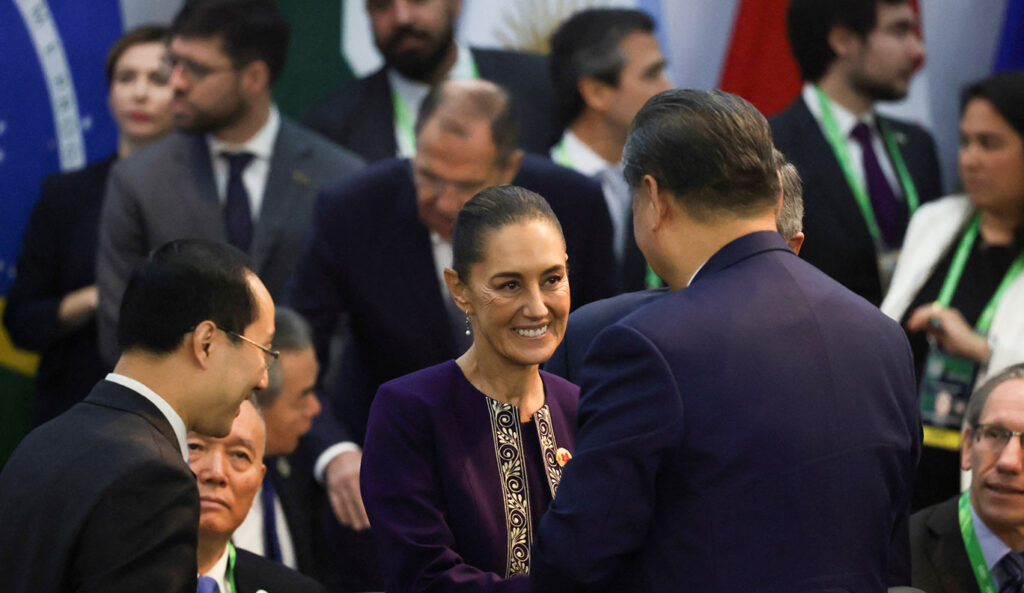Mexican President Claudia Sheinbaum and Chinese Communist Party General Secretary Xi Jinping shake hands during the G20 summit at the Museum of Modern Art in Rio de Janeiro, Brazil, in November 2024. REUTERS
DR. R. EVAN ELLIS/U.S. ARMY WAR COLLEGE
Investment and activities by Chinese companies in Mexico always have been more significant than generally realized. Between 2001 and 2023, the China-Latin America Network of Mexico’s prestigious National Autonomous University identified $20.8 billion in Chinese Communist Party (CCP) investment across 150 projects. That presence, and associated influence, likely will expand significantly in the coming years since China-based companies are well positioned in sectors prioritized by the current administration of Mexican President Claudia Sheinbaum.
China-based entities have dominated recent nearshoring-related investment in Mexico, particularly in warehousing, distribution and other operations, which help them preserve access to the U.S. market as U.S.-CCP tensions have made sourcing in China an increasing liability, according to an April 2024 report by the BBC. In 2023 alone, the Rhodium Group identified over $13 billion in Chinese investments in Mexico across more than 700 transactions.
In the port sector, China’s Hutchison Port Holdings operates three Pacific coast and one Atlantic coast port complexes, more than in any other country in the Western Hemisphere. China-based investors have also revived plans for a new megaport in Nayarit on the Pacific, according to reports by journalists in Mexico.
Complementing Chinese port operations, China Communications Construction Co. built the first phase of Mexico’s Maya tourist train and is positioned to win the contract to work on subsequent phases. China Railway Road Corp. won a $1.6 billion contract to modernize Line 1 of the Mexico City metro. Such presence advances Chinese companies’ chances to win work on ports, rail and highway projects in the Trans-Isthmus corridor between the Atlantic and Pacific to which Tren Maya will connect, as well as other major logistics projects.

In electricity, China’s State Power Industrial Corp.’s (SPIC) November 2020 acquisition of Zuma Energy gave it control of 800 megawatts of wind and photovoltaic electricity generation assets across four Mexican states. SPIC further expanded that portfolio in 2023 by acquiring 213 megawatts of capacity in three solar parks in Chihuahua state. SPIC’s posture positions it to work on renewable energy projects with Mexico’s Federal Electricity Commission and sell electricity to the national grid.
Problematic Chinese projects in Mexico, such as a proposed Dragon Mart in Cancun, as well as large persistent trade deficits in the CCP’s favor, have highlighted the question of who benefits from such investment, as well as corruption concerns and adverse environmental impacts.
The initial 2011 proposal for Dragon Mart Cancún described a shopping complex featuring goods from 2,500 Chinese companies on 1,400 acres just outside Cancún, bringing 5,000 jobs for Mexican workers. Environmental groups strongly criticized the project because it was located amid coastal wetlands 2 miles from Puerto Morelos Reef National Park, according to the online news magazine The Diplomat. Mexican business leaders said the project could also undercut local producers by flooding the market with cheap Chinese goods. The proposal eventually was shelved by Mexican regulators in 2015.
CCP-Mexico ties also have complicated organized crime problems in Mexico. The Sinaloa and Jalisco Nueva Generacion cartels have made the made the country a hub for fentanyl by using precursor chemicals imported from China, with little help from the CCP to control the flows. Engagement with the CCP, and the presence of Chinese financial institutions in Mexico, also have facilitated other forms of organized crime, including new money-laundering schemes, involving Chinese banks, gangs and the Sinaloa cartel.
Beyond such adverse effects, the CCP’s growing business clout leads many Mexican political and business elites to temper their criticisms of CCP behavior, including silence on CCP imprisonment of 2 million Uyghur Muslims in Xinjiang, violating treaty commitments, crushing dissent in Hong Kong, and bullying Taiwan and its neighbors in the South China Sea.
The expansion of people-to-people networks that accompany Chinese investment are equally worrying, from the numerous trips to China taken by local and national politicians, academics and journalists who are paid for by China’s communist government, to the nontransparent indirect benefits to those participating in groups like the China-Mexico Chamber of Commerce and China Friendship Committee in the Mexican Chamber of Deputies.
In the CCP’s 2017 National Intelligence Law, the Chinese government asserts its right to the data collected by China-based companies, while the country’s global security initiative recognizes data as a strategic security asset. Given the legal and political context, the substantial and expanding role of China-based companies such as Huawei, Hikvision and Didi in Mexico’s digital infrastructure raises questions about the ability of the Mexican government to protect its deliberations and data as well as the privacy and intellectual property of Mexican citizens and other residents of the country.
In the event of a conflict, dual-use facilities in Mexico operated by the CCP, such as ports and transportation infrastructure, could be exploited by the Chinese for military purposes. Mexico and the U.S. and Mexico share the consequences of security and economic conditions in the hemisphere. More broadly, collaboration addressing the issues raised by CCP engagement serves the national interests of both countries and of hemispheric security. Whether addressing issues of data security, fentanyl or future warfare threats, the U.S. has capabilities that it can share with trusted partners such as Mexico, and it arguably cannot manage such challenges without Mexico’s collaboration. It is vital for both governments to be guided by that reality.
Evan Ellis is Latin America research professor with the U.S. Army War College.
The opinions expressed here are his own and do not necessarily represent the policies or points of view of USNORTHCOM or the United States Government.

